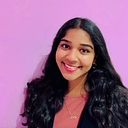My Accidental Discovery
“The most important thing in life is to learn how to give out love, and to let it come in” — Morrie Schwartz
I sat in 7th grade History, listening to my teacher lecture about the New World. But how did Columbus become so lost if he was using a map? I went home, opened my laptop — and was shocked. The first map I came across was the Martellus map, which made the Earth look like a lima bean drowned in navy blue. There were only three continents: Europe, Asia, and Africa. As I was observing the shattered Australia, a boot-shaped Africa, and a deformed Asia, I felt as if I was experiencing virtual reality.
I was immediately transported into a past world. From that day, I wanted to learn about cultures and languages all across the world, and this desire gave me a lifelong fascination with maps.
Later, like Columbus’s accidental discovery, this love would have its own unexpected effect on me when I joined Paper Airplanes, an organization dedicated to improving the lives of immigrants and refugees around the world. I wanted to connect with people that were far from me and learn more about their experiences and culture, but I never could have guessed where this would lead.
Through the organization’s Youth Exchange Program, I trained to become a tutor for Syrian refugees preparing for the TOEFL. I learned how to work with survivors of trauma, and facilitate intercultural communication to teach refugees and make them feel secure. In the curriculum, I was shocked when I learned about triggering words such as police, abandonment, and violence — words that can cause intense panic attacks and physical shaking. On the other side of the world, halfway across my map, 22 million Syrian refugees were displaced, having no home or access to education. I was determined to do my part and help one student who could be the first of their family to access higher education.
After the training program, I was finally assigned a student: Mahmoud, a hazel-eyed, 18-year-old who lives in Aleppo, Syria. We work together over Skype, and I teach him new vocabulary and grammar while encouraging him to read English books.
But this wasn’t a one-way relationship; it was an exchange of knowledge, culture, and language. I learned how to say “See you later” in Arabic when addressing a male (araaka laahiqan) and when addressing a female (araakee laahiqan). Mahmoud explained how the Internet is very limited in Syria and how difficult it is to access certain websites. Mahmoud often told me about the unequal education system, and how he heard bombs dropping in his neighborhood.
This flood of new information overwhelmed me; the daily struggle refugees go through to fulfill a dream as simple as attending college left me speechless. The unfamiliarity between our two cultures, the gap that had separated us, closed as we shared our lives. Little details, like the color of our walls or the weather, made us seem different… but also so alike.
Mahmoud helped me see my life from a different perspective. What if there was a single test that determined my future? What if the library by my home had less than a dozen books? We both encourage each other, and push each other to be better versions of ourselves.
Now when I look at a map, I’m not transported to the past. I experience a new kind of virtual reality, a reality where I can see refugees in Syria, Turkey, Germany, and Jordan fighting for their lives. I feel the histories and struggles of refugees coming alive, sprouting from each continent on the map. Though we may live in different countries, though our dreams and realities might vary, we are connected through a map: a single record that unifies us all.
